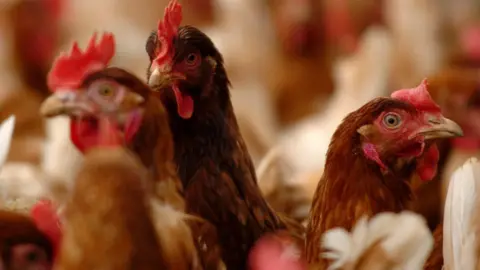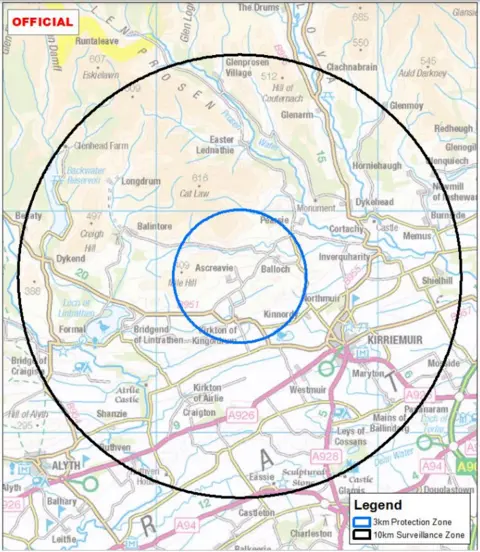Bird flu outbreak 'no risk to humans' - chief vet
 PA Media
PA MediaThere is no risk to human health from a bird flu outbreak in Angus, Scotland's chief veterinary officer has said.
Sheila Voas said the public did not need to be concerned and that precautions were being taken to keep people safe.
Highly pathogenic avian influenza (HPAI), of the H5N1 strain, was reported at Over Ascreavie House, Kingoldrum, in the Kirriemuir area, on Friday.
Ms Voas told BBC Scotland News it was a backyard holding of six chickens and three had died overnight.
After an investigation, the chickens were found to have H5N1.
Ms Voas said anyone who was responsible for birds should practice good biosecurity.
She added: "The public don't need to be concerned about this.
"It's a disease of poultry, and there's no evidence that the varieties that we have in the UK have any mammalian adaptation that would make it a significant problem for humans.
"You do occasionally get very mild human infections in people who are exposed to birds very, very closely.
"But that's rare and it's not usually severe."
 Scottish government
Scottish governmentA 3km (1.8 mile) protection zone has been implemented around the area and a 10km (6.2 mile) surveillance zone has also been declared.
Enhanced surveillance will take place in the zones over the next few weeks.
The restrictions put in place stop the movement of poultry, carcases, eggs, used poultry litter and manure to prevent any further spread of disease.
It marks the first case of the avian illness in the country since the summer of 2023.
The Scottish government noted the risk to the public is "very low", even for those who face prolonged exposure to infected birds.
A spokesperson said: "Keepers of poultry and other captive birds in Scotland are advised to remain vigilant for signs of the disease and reminded they have a legal requirement to immediately report any suspicion of disease in Scotland to the local Animal and Plant Health Agency Field Services Office.
"The risk to the general public's health from avian influenza is still very low and is considered low for people with intensive exposure to infected birds.
"Food Standards Scotland advises that avian influenzas pose a very low food safety risk for consumers."
What is bird flu?
Bird flu is a disease caused by a virus that infects birds and sometimes other animals, such as foxes, seals and otters.
The dominant H5N1 strain emerged in China in the 1990s.
Scientists said the risk to humans was low when the strain began affecting cattle herds in the US last summer.
Transmission from birds to humans is rare and there has been no sustained human-to-human transmission.
